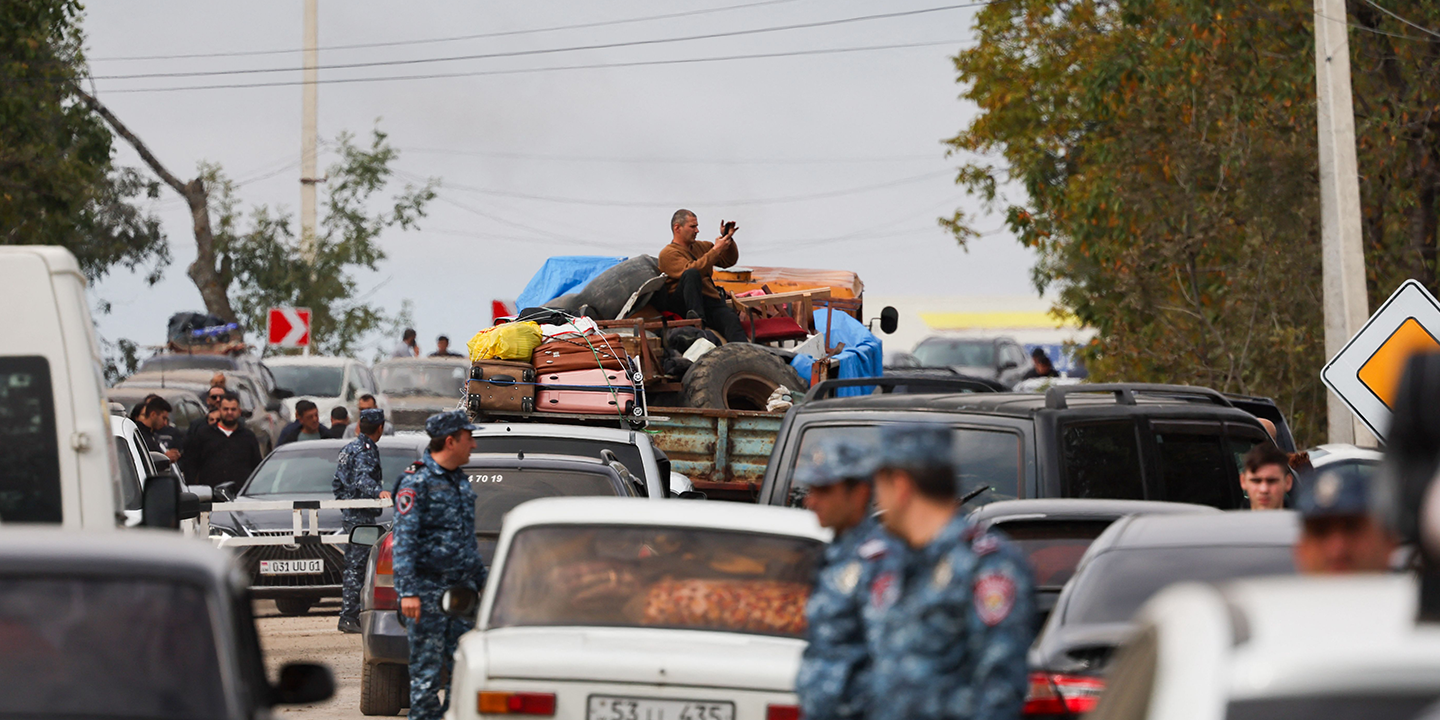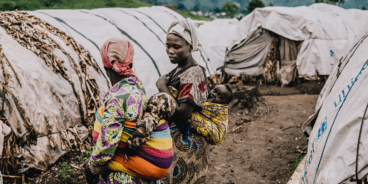

Atrocity Alert No. 366: Nagorno-Karabakh, Ukraine and Venezuela
Atrocity Alert is a weekly publication by the Global Centre for the Responsibility to Protect highlighting situations where populations are at risk of, or are enduring, mass atrocity crimes.
HOSTILITIES IN NAGORNO-KARABAKH DISPLACE THOUSANDS OF ETHNIC ARMENIANS
On 19 September 2023 Azerbaijani armed forces launched a military operation in Nagorno-Karabakh under the pretense of “anti-terror measures” and regaining regional control of the territory. Over a 24-hour period Azerbaijani forces launched attacks using heavy artillery, drones and mortars, killing hundreds of people and damaging civilian infrastructure. On 21 September a ceasefire was announced, including provisions for the Armenian de-facto authorities in Nagorno-Karabakh to disband its local military and government structure and for the reintegration of the region into Azerbaijan.
There are currently no formal guarantees for the security of ethnic Armenians remaining in Nagorno-Karabakh or protection from reprisals. The hostilities, as well as ongoing concerns for their safety under the ceasefire agreement, has already reportedly prompted more than 42,000 civilians, predominately ethnic Armenians, to flee from Nagorno-Karabakh. At least 68 people were killed and nearly 300 injured in their attempt to flee when a gas station exploded on 26 September.
The military intervention followed a nine-month-long blockade of the Lachin Corridor, the sole road connecting Nagorno-Karabakh with Armenia. The blockade prompted acute shortages of life-saving resources such as food, medicine, electricity and fuel. Beginning in mid-July, Azerbaijani authorities intentionally and unlawfully disrupted the transport of humanitarian assistance into the enclave, in violation of International Humanitarian Law. Prior to the recent hostilities, transport through the Lachin Corridor had just resumed on 18 September. The ongoing humanitarian crisis contributes to fears that the situation will continue to deteriorate, resulting in grave protection risks for ethnic Armenians.
On 21 September the UN Security Council convened a briefing to discuss the situation in Nagorno-Karabakh. During the session, Miroslav Jenča, UN Assistant Secretary-General for Europe, Central Asia and the Americas, reiterated that despite the establishment of a new ceasefire agreement, the recent escalation is part of a “broader pattern of ceasefire violations which have continued to persist.” Cycles of violence and the lack of genuine commitment to peace agreements on behalf of all parties to the conflict, paired with the failure of Azerbaijan to provide protection and guarantees to its ethnic Armenian population, creates an environment conducive to the commission of atrocity crimes.
It is essential that the rights of displaced populations be protected and that they receive humanitarian support. Any reintegration efforts put forth by the Azerbaijani government must be reconciliatory and preserve the ethnic identity of the Armenian people, guaranteeing ethnic Armenian residents of Nagorno-Karabakh all rights and freedoms in line with relevant international human rights instruments.
UN COMMISSION DECRIES ONGOING WAR CRIMES IN UKRAINE
In an update to the UN Human Rights Council (HRC) on 25 September the Chair of the International Independent Commission of Inquiry (CoI) on Ukraine, Eric Møse, said that war crimes were being perpetrated against populations in Ukraine by Russian forces. In his statement, Commissioner Møse particularly highlighted the continuing attacks on civilians, civilian infrastructure and medical facilities as evidence of potential crimes.
The Commission is currently investigating the widespread use of torture and sexual violence in Russian-occupied areas, namely Kherson and Zaporizhzhia, to determine if the abuses amount to crimes against humanity. A victim who spoke with the CoI who had suffered torture said, “Every time I answered that I didn’t know or didn’t remember something, they gave me electric shocks. […] I don’t know how long it lasted. It felt like an eternity.” The Commissioner also stated that some people were so brutally tortured that it caused their deaths. Furthermore, in some cases of sexual violence in occupied area of Kherson, family members were kept in an adjacent room, thereby forced to hear the violations taking place.
The CoI is also investigating allegations by several states that Russia is potentially perpetrating acts of genocide in Ukraine. Commissioner Møse stated that “some of the rhetoric transmitted in Russian state and other media may constitute incitement to genocide.” Russian state-owned media channels have utilized eliminationism in their reporting of the situation in Ukraine, in some cases calling for the destruction of the entire country while other times diminishing the ethnic, cultural and linguistic differences between Russians and Ukrainians.
The Commissioners highlighted the ongoing issue of forcible transfer of children from Ukrainian territory into Russia and how lack of information on the number or circumstances of the children will likely hamper any return processes. In the CoI’s first report in October 2022, the Commission found that Russian authorities took children with the aim of placing them in the Russian Federation, including preventing institutions for children, many with disabilities, from evacuating as fighting approached. In March 2023 the International Criminal Court issued arrest warrants for Russian President Vladimir Putin and the Commissioner for Children’s Rights in the Office of the President of Russia, Maria Alekseyevna Lvova-Belova, for their alleged responsibility for the deportation and transfer of population (children) from occupied areas of Ukraine to Russia.
The Global Centre for the Responsibility to Protect’s Executive Director, Savita Pawnday, said, “As abuses by Russian forces continue unabated in Ukraine, the international community must continue to support Ukraine in investigating and holding accountable those who have perpetrated atrocities, regardless of affiliation, while upholding the highest standards of international law and due process.”
UN EXPERTS WARN OF A “STATE OF PERMANENT CONTROL, VIGILANCE AND FEAR” IN VENEZUELA
On 25 September the Independent International Fact-Finding Mission on Venezuela (FFM) presented its latest report to the UN Human Rights Council (HRC), warning that the government of President Nicolás Maduro has intensified policies of crushing dissent, including through targeted attacks on civic and democratic space.
According to the FFM, in recent years, the government has resorted to selective repression – specifically targeting civil society organizations, trade and labor unionists, independent media, as well as political opponents and their families – to “silence, discourage and stifle away any real or perceived opposition.” High-ranking officials regularly resort to public smear campaigns and harassment against human rights defenders and journalists, which, together with ongoing threats and surveillance, has contributed to an environment of fear and self-censorship. Various patterns of serious human rights violations and wider repression are being used with “different levels of intensity, according to the nature and strength of social dissidence,” showing “the State’s capacity to adapt in order to silence criticism.”
The FFM has previously warned that some violations and abuses committed in Venezuela over the past nine years were part of a “widespread and systematic attack” against the civilian population, implicating President Maduro and other high-level government officials in orchestrating a state policy to silence opposing voices. The FFM warned that some of the ongoing violations and abuses involve some of the same elements as acts previously identified as crimes against humanity.
The FFM’s latest report also warned that various state institutions used for systematic violations and abuses remain unchanged. After the publication of the FFM’s first report, which identified the Special Action Forces (FAES) of the Bolivarian National Police as one of the main perpetrators of thousands of extrajudicial executions, the Maduro government had alleged its dissolution. However, the latest report documented the subsequent establishment of a new Directorate of Strategic and Tactical Actions (DAET), which displays “similar functions and uses the same modus operandi as the FAES,” including the presence of senior individuals previously alleged to be involved in the commission of possible crimes against humanity.
The FFM report reinforces observations that the root causes of possible crimes against humanity – including command structures in security and intelligence forces, lack of judicial independence and persistent impunity – remain in place. Elisabeth Pramendorfer, Latin America expert at the Global Centre for the Responsibility to Protect, warned that “the FFM report provides an assessment that atrocity risks will further escalate ahead of scheduled Presidential and legislative elections in 2024 and 2025. The international community, including Latin American governments with leverage over the Maduro government, have a critical window of opportunity to exert pressure on authorities to end systematic repression, open civic space and ensure credible and independent observations of scheduled elections.”
Related Content


